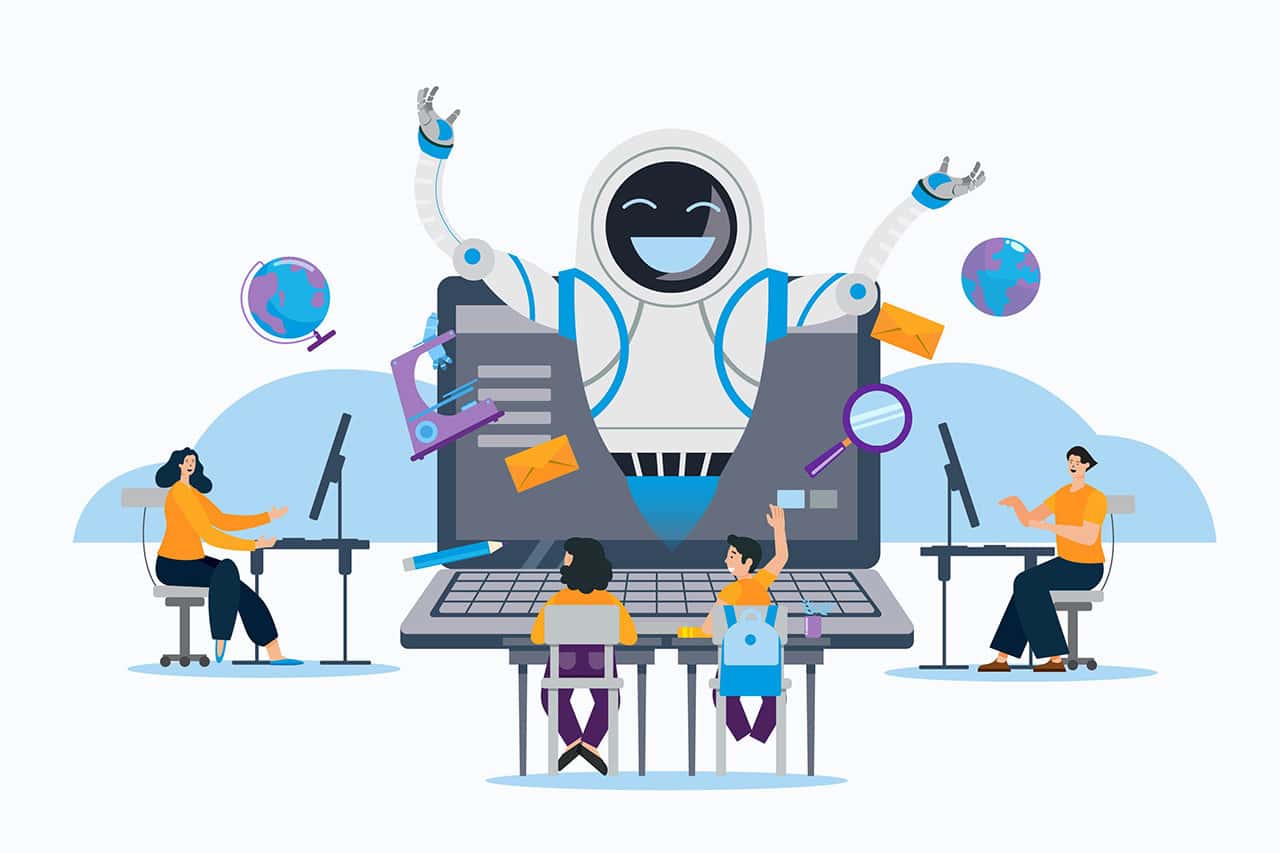The world of education and training is continuously evolving, and cutting-edge AI technologies are revolutionizing the way course and training providers operate. In this blog post, we will delve into how AI solutions can be utilized by training providers to improve operations, streamline course management, enhance learning, provide better customer service and reduce administrative workload. Get ready to be amazed by some fascinating stats that show the true potential of AI in transforming the education and training industry and learn about different solutions that can help your own training business today.
ℹ️ What is AI?
AI stands for Artificial Intelligence. It refers to the development of computer systems that can perform tasks that would typically require human intelligence. These tasks include learning, reasoning, problem-solving, perception, understanding natural language, and even creativity. AI systems are designed to process large amounts of data, identify patterns, and make decisions based on their analysis, often surpassing human capabilities in speed and accuracy.
📖 Table of Contents
In a rush? Click on the headings below to navigate to your preferred section of this blog post.
Reduce Administrative Burden & Time spent on Training and Course Management
Improve Learning and Engagement
Reduce Administrative Burden & Time Spent on Training and Course management
According to Accenture, the implementation of artificial intelligence (AI) can boost business productivity by up to 40%. This allows staff members to focus on more value-adding activities, like developing innovative course content or engaging with course participants, ultimately improving the quality of the learning experience and boosting overall productivity. Embracing AI-powered administration is a smart move for training and course providers looking to optimize their operations and stay competitive in today’s fast-paced market.
Let’s have a look at how AI solutions can minimize the administrative workloads in your training business.
Intelligent scheduling
Intelligent scheduling is a prime example of how AI-driven solutions are transforming the way training providers manage their administrative tasks, significantly reducing workload and boosting efficiency. This application employs algorithms to analyze multiple factors, such as room availability, instructor preferences, and participant demand, to optimize course scheduling. By automating this complex process, AI saves time and eliminates manual errors while ensuring optimal resource allocation.
You can find features like this in some Training Management Systems, but there are also separate solutions that can help you with this. Event Temple is an event and venue management platform that features AI-driven scheduling. This software helps training providers schedule courses by taking into account multiple factors as mentioned above. Event Temple is integrated with Zapier, which means that you can basically integrate the system with any of your other favorite systems.
Simplifying feedback and grading
AI-powered tools, such as Gradescope and Turnitin, can grade assignments and exams with remarkable speed and accuracy, reducing the time spent on manual grading by up to 50% or more. By automating feedback generation and providing personalized recommendations, AI enables instructors to deliver targeted, actionable insights that help learners improve their performance. These tools will also minimizing human error and bias, which can result in improved participant satisfaction for your training business.
Automating repetitive tasks
AI-driven automation is a game-changer for the training and course industry, as it can significantly reduce the time and effort spent on mundane, repetitive tasks.
By utilizing intelligent tools like UiPath, Automation Anywhere, and Zapier, providers can streamline processes such as data entry, record-keeping, and email management.
This can also be done by using a complete Training Management System. A Training Management System (TMS) is a comprehensive software solution designed to simplify and automate various aspects of running a training business. By integrating AI-powered features, a TMS can streamline repetitive tasks and enhance overall efficiency. For example, a TMS can automate processes such as course registration, invoicing, and certificate issuance, significantly reducing the administrative workload.
If you want to learn more about how a training management system can improve your training business, take a look at our complete training management guide here.
Enhancing Course Quality
AI not only offers the potential to optimize operations but also plays a crucial role in improving the quality of courses. By leveraging AI, training providers can gain valuable insights into how their courses are performing, enabling them to make data-driven adjustments and ensure that their offerings meet industry standards. Most learning and training management systems will have some features related to this.
ℹ️ Did you know?
FrontCore Training Management System has a Training Analytics Dashboard with quick access to past and current KPIs helping your training business make smart choices in operations, marketing and strategy. This leads to better use of resources by focusing on successful courses and improving weaker ones.
Generate course descriptions
AI can be utilized to generate course descriptions for training providers by analyzing existing course materials, learning objectives, and industry trends. By employing natural language processing and machine learning techniques, AI systems can craft concise, informative, and engaging descriptions tailored to the target audience. This not only saves time for training providers but also ensures consistency in messaging and enhances the overall appeal of your course offerings.
Additionally, AI-generated course descriptions can be quickly updated to reflect evolving industry needs, keeping the content relevant and up-to-date.
FrontCore is currently working on developing a brand new Learning Managament System with features like this. Sign up here to get a sneak peak before everyone else.
Something exciting is launching very soon…

Improve Learning and Engagement
AI solutions can elevate learning experiences and boost course engagement in various ways, optimizing training for both the participants and the course providers. Let’s dive into the finer points of this topic, providing you with valuable insights and specific tools and solutions you can apply.
Personalized learning paths
By analyzing participant data, AI algorithms can create tailored learning paths that cater to individual needs and preferences, resulting in improved knowledge retention.
A few notable examples of AI solutions that enable personalized learning paths include:
- Smart Sparrow: An adaptive learning platform that empowers educators to design and deliver personalized learning experiences. By using AI algorithms, the platform allows instructors to create dynamic content and assessments that adapt to individual participants’ needs. This customization helps keep participants engaged and motivated while ensuring they receive the support required to achieve their learning goals.
- Knewton: an AI-driven adaptive learning platform that personalizes learning paths based on a participants’ performance, preferences, and learning style. Knewton’s platform analyzes each participants’ progress, strengths, and weaknesses to provide a customized learning experience with real-time feedback and tailored content.
Gamification of course materials
Nearly 70% of course participants prefer gamified classes and learning experiences over traditional education methods, citing increased motivation and engagements as the primary factors drawing them to gamified learning. Research actually shows that AI-generated interactive quizzes, puzzles, and games can increase participant motivation and retention by up to 40%.
You can use easy, but still popular, tools like the game-based learning tool Kahoot! or Quizlet to make flashcards, quizzes, and games, to help your participants practice and retain information. Or you can go the more advanced routine and try out more complex gamification solutions, such as Growth Engineering.
Growth Engineering is an award-winning LMS platform that emphasizes gamification and social learning to engage adult learners. The platform incorporates game mechanics like points, badges, and leaderboards to motivate learners and drive engagement. Additionally, Growth Engineering supports various content types, including interactive quizzes, branching scenarios, and multimedia resources, making it suitable for diverse training needs.
They also have a fun and very fitting slogan: “Waging war on dull online learning just got easier.”
Also read: Gamification in Training: 4 Ways to Bring Games Into the Classroom
Real-time feedback
Chatbots can offer personalized support and guidance to course participants, leading to improved academic performance and a decrease in the number of participants who fail the course.
By leveraging the power of artificial intelligence, chatbots can quickly analyze learner responses and provide targeted feedback, reducing the time and effort required by educators to give individualized attention to every learner. The real-time feedback provided by the chatbot can also help bridge the gap between participants and educators, making it easier for participants to get the help they need to succeed.
Interactive case studies
During the 1880s, psychologist Herbert Ebbinghaus made a groundbreaking discovery in his field by identifying what he termed “The Forgetting Curve.” This concept illustrated the rate at which we forget information over time. Ebbinghaus determined that, in the absence of reinforcement or connections to existing knowledge, information is rapidly forgotten—approximately 56% within the first few hours, 66% after a single day, and 75% after six days.
Nonetheless, implementing newly acquired knowledge and abilities in a professional setting can significantly reduce this forgetting curve, particularly if this application occurs within six days following the learning experience. Interactive case studies make this easy.
Interactive case studies are immersive, scenario-based learning activities that help training participants develop problem-solving skills, apply their knowledge, and better understand complex concepts. These case studies place learners in realistic situations, encouraging them to analyze information, make decisions, and reflect on the consequences of their choices. This experiential learning approach promotes critical thinking, collaboration, and practical application of knowledge.
For Example, Articulate Storyline 360 is a powerful eLearning authoring tool that enables training providers to create interactive case studies, simulations, and other engaging learning activities. With its intuitive interface, customizable templates, and built-in interactivity features, Storyline simplifies the process of designing scenario-based learning experiences that promote critical thinking and problem-solving skills.
Here are some examples of courses build in Articulate 360:
Adaptive assessments
Adaptive assessments, provided by solutions like ScootPad, are AI-driven evaluations that adjust to individual participants’ progress, providing a more accurate measure of their understanding and ensuring a fair and personalized evaluation. These assessments analyze participants’ responses in real-time, modifying the difficulty level and type of questions to match their abilities and knowledge. As a result, adaptive assessments can better identify learners’ strengths, weaknesses, and areas for improvement.
Automating content creation
AI-generated course content can save your business up to 50% of time spent on manual course content creation. Tools like Quillionz and OpenAI’s GPT-4 can automatically generate quizzes, assessments, and even entire course materials based on the desired learning objectives.
Another great example is the more advanced tool Elai. Elais allows you to create AI videos from just text and build customized AI videos with a presenter in minutes without using a camera, studio and a green screen. Have a look at this video to get inspired:
Simplify complex subjects
AI-powered tools can assist course participants in grasping intricate topics by offering straightforward and intuitive explanations that elevate the learning experience.
A prime illustration of such a tool is Microsoft Math, an application that utilizes Optical Character Recognition (OCR) technology. This app detects mathematical equations from images and provides the solution. Additionally, it offers comprehensive, step-by-step solutions that include in-depth explanations and interactive graphs, enabling participants to learn more effectively.
Boost Community & Collaboration
A lot of course participants are missing aspects of the physical classroom training while doing online training: Such as the feeling of a community, social and emotional input and collaboration options. Sometimes the participants struggle with this in the physical classroom too. Let’s have a look at how AI can help boost community and collaboration for your participants.
Real-time language translation
AI-powered language translation tools can provide instant translation services for multilingual courses, breaking down language barriers and promoting a more inclusive learning environment. Take a look at these two popular tools:
- Microsoft Translator: Microsoft Translator is an excellent AI-powered translation tool that supports real-time translations in more than 60 languages. It can be integrated with Microsoft Teams, PowerPoint, and other platforms, facilitating smooth communication and collaboration among learners and instructors who speak different languages.
- DeepL Translator: DeepL is an AI-based translation tool that provides accurate and natural-sounding translations in several languages. It can be used as a standalone tool or integrated into learning platforms, enhancing communication and collaboration among multilingual learners.
These tools can not only be used for online learning, but also in physical classrooms to create an inclusive learning environment and a sense of community among training participants, regardless of their native language. Here’s an example from when a a group of Chinese students stopped by the Microsoft AI and Research offices to learn about Microsoft Translator’s speech translation technology:
Collaborative Learning
AI algorithms can be used to match course participants with peers who have similar learning goals and interests, fostering collaborative learning. Group projects, discussions, and virtual events can be organized to encourage peer-to-peer interaction and knowledge sharing.
Virtual Communities
AI-powered chatbots and virtual assistants can be used to create virtual communities that simulate the social interaction of a physical classroom. Students can interact with these bots to get support, guidance, and feedback on their coursework. For examples, the Learning Management System Moodle offers plugins like the “Moodle Chatbot” or “Moodle Virtual Assistant” that enable the inclusion of AI-powered chatbots within the learning platform. These chatbots can engage in conversations, provide support, and foster interaction among learners.
ℹ️ Did you know?
FrontCore Training Management System has an integration with the popular Learning Management System Moodle. Learn more here.
Social Presence
AI can be used to create a more personalized and social experience for participants. For example, AI-powered avatars can be used to simulate face-to-face interactions with instructors and peers, creating a more social and engaging learning experience.
While there are various approaches to implementing AI-powered avatars, Soul Machines offers an AI-driven Digital People platform that creates realistic and interactive avatars. Their avatars can provide personalized instruction, answer questions, and engage in conversations with learners, replicating human-like interactions.
Emotion Recognition
AI can detect participants’ emotions and provide support accordingly. For example, if a course participant is feeling stressed, the AI can recommend relaxation techniques or provide links to resources that can help them manage their stress. By providing emotional support, AI can help participants feel less isolated and more connected to their classmates and instructors.
Overall, AI can play a crucial role in making online learning less lonely for participants by providing personalized learning experiences, creating virtual communities, fostering collaborative learning, creating a more social experience, and providing emotional support.
Offer Better Customer Service
Delivering exceptional customer service is crucial to retaining and attracting new customers to your training business. AI solutions can enhance the customer experience by:
Providing instant support
AI chatbots can handle up to 80% of routine queries, reducing wait times and increasing customer satisfaction. They can handle customer inquiries 24/7, providing instant support and freeing up your staff for more critical tasks. In fact, AI-powered chatbots can reduce email volume by up to 60%. Consequently, the customer service costs can be reduced by 30%.
For instance, at the Reverse Dermatology Clinic, around 80% of social media inquiries remained unaddressed as the reception staff concentrated on phone calls and assisting in-person customers. By introducing an AI chatbot as a dermatological aide, the clinic managed to promptly address all customer inquiries. In a span of 16 months, the AI chatbot, Dr. Ross, answered over 10,000 messages from more than 1,400 clients, with the majority (35%) occurring after business hours. The complete case study on the successful deployment of the Reverse AI chatbot can be found here.
The Reverse Dermatology Clinic used a chatbot powerd by Umni AI, but there are more AI-powered chatbots you can explore: Check out well known providers such as Ada, Chatfuel, and Intercom.
Offering personalized recommendations
While personalized recommendations might seem like something that is “nice to have”, one consumer study showed that 71% of buyers expect companies to deliver personalized interactions, and 66% are frustrated when brands don’t deliver on this expectation.
This means that using AI algorithms to analyze participant data and suggest tailored courses might be something that is expected by your participants, and that you might fall behind your competitors if you’re not offering this.
In addition, studies also show that AI-enabled personalized recommendation systems could increase participants’ learning motivation. Increased motivation means increased learning and learning outcomes, which might also result in higher customer satisfaction and better customer retention.
There are a number of AI solutions that training providers can use to make personalized recommendations for participants. Knewton’s Alta is an AI-powered adaptive learning platform that provides personalized recommendations to learners based on their performance and learning preferences. It identifies areas where a learner is struggling and suggests targeted materials for improvement.
Docebo’s learning platform also uses AI to deliver personalized content recommendations. It uses learner data to predict what content a learner might need or find interesting, enhancing engagement and the learning experience.
Sentiment analysis
AI tools such as IBM Watson and MonkeyLearn can process large volumes of customer feedback from various sources like surveys, social media, and online reviews. These tools analyze the tone and emotions expressed in the text to gauge overall customer sentiment. This can help your training business pinpoint areas where customers are most satisfied or dissatisfied, helping you to focus on what works and address areas of concern.
ℹ️ Did you know?
FrontCore Training Management System allows you to easily identify upselling opportunities based on participants’ training history. Check out our Sales Module to learn more.
Harness the Power of AI for Your Training Business
It’s evident that AI has the potential to transform the training and course industry – Including your own training business. As a training and course provider, it’s essential to stay ahead of the curve and embrace the benefits of AI to improve your operations. Here are some actionable steps to get started:
- Identify key areas where AI can have the most significant impact on your business.
- Research and select suitable AI tools that cater to your specific needs.
- Invest in training your staff to effectively utilize AI solutions.
- Continuously monitor and evaluate the performance of AI tools to ensure desired outcomes.
Unlock your future potential with AI now
By integrating AI solutions into the administraion work and learning processes, course and training providers like you can create more engaging, personalized, and effective training experiences. These AI-driven tools not only support instructors and administrators but also empower participants to take charge of their learning journey. Embracing AI is a critical step towards shaping the future of education and training, leading to better outcomes for all stakeholders. As AI technologies continue to advance, the potential for further innovation and transformation in the education and training industry is vast and exciting. Get started today by exploring the solutions mentioned in this blog post. Unsure of where to start? Check out our praised Training Management System now.
Did you like this article? Don't forget to share it:










0 Comments